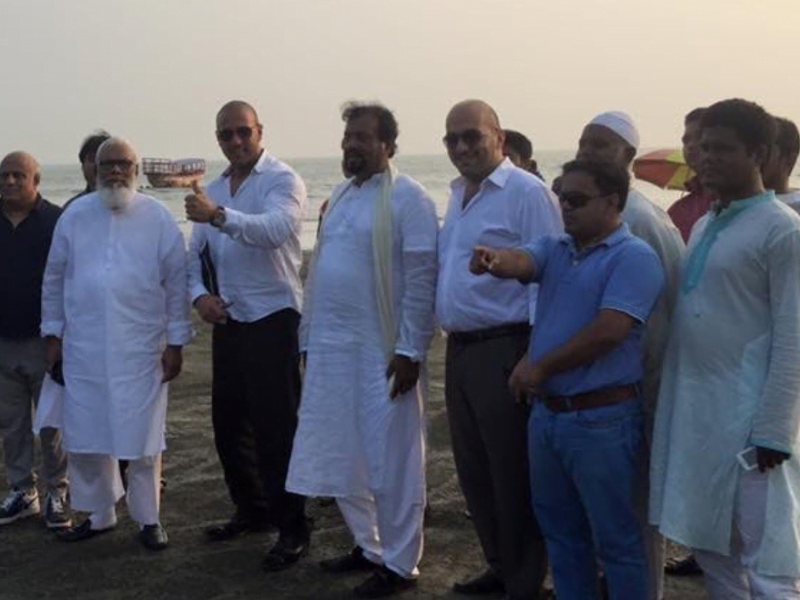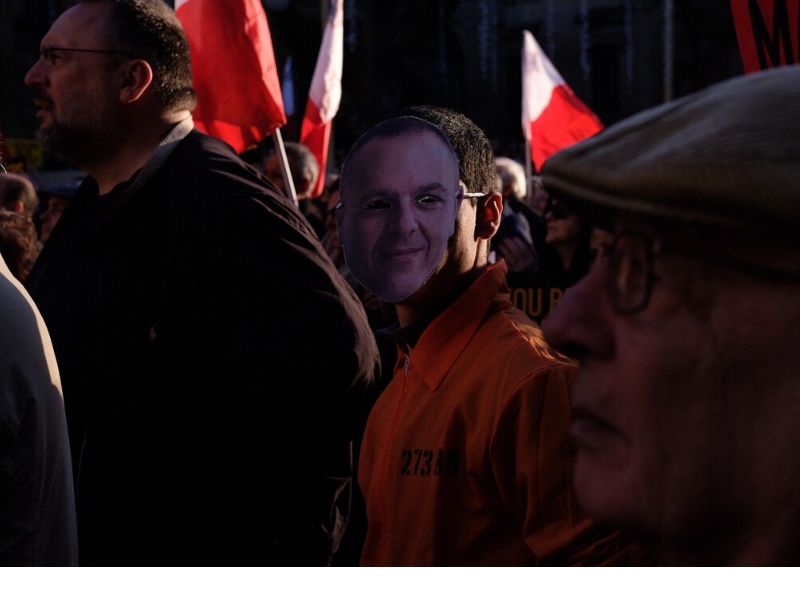The public inquiry hearing on Monday touched upon a number of major scandals that have rocked the Labour government since its early years in office, with Keith Schembri, the chief of staff of disgraced former Prime Minister Joseph Muscat, being grilled on his role at the helm of government as well as his vast private business interests.
Former Judge Michael Mallia, who is leading the inquiry, had a large pile of papers with questions for the former chief of staff, who is out on police bail following a court order freezing his assets on suspicions of money laundering. Schembri has been linked to a number of major scandals from the hospitals’ deal to allegations of bribes to The Times of Malta former Managing Director Adrian Hillman to Electrogas and Yorgen Fenech’s interests in Bangladesh.
Fenech, the man accused of commissioning the murder of journalist Daphne Caruana Galizia, had named Schembri as involved in the plot. The compilation of evidence against Fenech is ongoing.
‘A shadow’ over Electrogas
Schembri played down concerns by the Judges that the project was a speedy one, done merely six months after the Labour Party won the elections in 2013.
Chief Justice Emeritus Joseph Said Pullicino said there seemed to be a specific project planned: “It materialised in a few weeks from nothing, with people and specifications.”
Schembri insisted it was the idea of the project and not the project that was pre-planned.
“We cannot accept the fact that such a complex power station was not discussed before with some people… a power station is extremely technical,” Mallia said when Schembri insisted it was a simple project.
Schembri denied ever speaking to the Gasans, Fenechs and Apap Bolognas about energy prior to the election.
“You know there is a shadow over the project,” Said Pullicino warned.
Questions on Bangladesh
Schembri said that his interests in Bangladesh were in the maritime sector and were not linked to the energy project by Fenech.
An investigation by The Shift has revealed that Fenech tried to replicate the energy deal in Bangladesh. “This is common knowledge,” Schembri said, despite Fenech’s partners in the consortium saying they knew nothing about it.
Nexia BT’s Karl Cini had told Mossack Fonseca that the secret Panama companies owned by Schembri and former Minister Konrad Mizzi would hold shares in companies that were active “in the sectors of recycling [and] remote gaming”. The recycling business would take place in India, Dubai and other Gulf countries.
By December 2015, this rather dry business plan would expand dramatically. Cini then sent another email, this time to Juan Carlos Martinez from MossFon’s head office in Panama, in connection with the opening of bank accounts for Schembri and Mizzi’s companies.
The previously dry “recycling and remote gaming” business plan now included three additional items: Infrastructure projects with target countries including Africa, India and the sub-continent (Pakistan, Bangladesh, Bhutan, Nepal, Maldives and Sri Lanka); maritime and fisheries with just one target country being Bangladesh, and tourism in Asia.

Franco and Yorgen Fenech in Bangladesh.
Schembri repeated the line before the public inquiry that he intended to do business with Fenech after he retired from politics.
Questioned by Comodini Cachia, Schembri then confirmed that Bangladesh was one of the prospective countries in which he was seeking potential business. He denied ever having business with Fenech, but said that he had project interests in doing business in Bangladesh and planned to make use of Fenech’s connections and interests there.
“My idea was to do so when I left politics,” he said.
The board asked Schembri about his friendship with Fenech. Schembri said that Fenech had helped him.
“Did you help Fenech after he helped you?” asked Said Pullicino. Schembri said Fenech did ask him for advice.
‘Nothing illegal’ with offshore accounts
The board focused on 17 Black and the emails sent by Nexia BT to Mossack Fonseca exposed in the Panama Papers. “Before I went into politics I already had offshore structures, there is nothing illegal,” said Schembri, a line he often repeated throughout the sitting.
After reiterating his reasoning for opening the structures, Schembri turned to a new narrative – the companies opened by Mossack Fonseca through Nexia BT were common practice, in which the company would open a number of companies at one go.
He said he did not know that Nexia BT was opening them and that he did not know why they wrote Macbridge as a potential target client and why they said that the company will be receiving €50,000 a month.
Said Pullicino reminded Schembri to be careful.
“Is it normal for them (financial companies like Nexia BT) to not consult the client?” asked Judge Abigail Lofaro.
“But how do you explain that instructions were given for both you and Mizzi to open them on the same day?” asked Said Pullicino.
“It had nothing to do with Dr Mizzi,” Schembri replied.
“This is something that tore down the government!” Said Pullicino reminded Schembri.
According to Schembri’s version of events with regards to his Tillgate company, he provided Nexia BT with a list of potential clients and sources of funds but said that Macbridge was not one of the clients he had given and does not to whom it belonged.
“So you want us to believe that you gave them a list of clients, and Macbridge was invented by Nexia BT?” asked lawyer Therese Comodini Cachia.
“I did not say that, I just know that I did not give them Macbridge,” said Schembri.
Pressed by Comodini Cachia about whether he had asked his auditors where Macbridge came from. Schembri said he had asked them but they “couldn’t find it anywhere”. The owner of Macbridge remains unknown.
This was met with disbelief by the board. Such a potential error could “associate you (Schembri) with criminal activity,” said Said Pullicino.
“If someone did this to me I would kick out my auditor and find a new one, these are serious things,” said Lofaro.
“Now I won’t be keeping them, for sure,” said Schembri.
Lofaro replied, “you don’t need my advice”.
“You are not credible, I am sorry,” said Said Pullicino.
Allegations against him ‘not serious’
Schembri defended his choice of Nexia BT until they were shut down. “It is difficult to change auditor,” he said. But when asked if he had even tried, Schembri said, “no”.
“Even though they indicated Macbridge as your client, which you knew nothing about, even though they said you would be receiving €50,000 a day when you are saying you weren’t,” Comodini Cachia continued.
“These are serious allegations,” said Said Pullicino.
“These aren’t serious,” replied Schembri.

A protester with a photo of former chief-of-staff Keith Schembri as a mask during an anti-corruption protest in December 2019. Photo: Joanna Demarco
Comodini Cachia asked Schembri about a press release issued by the Office of the Prime Minister in Schembri’s name, which stated that “17 black and Macbridge were included in draft business plans as business clients”.
“Could you tell me whether you said the truth about Macbridge then or you are saying the truth now?” she asked.
“It says they ‘were included’… but not by me,” Schembri replied.
“In the press release you showed affiliation towards Macbridge,” noted Said Pullicino.
Comodini asked Schembri about the similarity between Nexia BT’s request for both him and Mizzi. Schembri denied recommending Nexia BT to Mizzi and insisted that he did not have any business with him.
‘I never did anything behind the prime minister’s back’
Schembri read out one sentence that he claimed was from a report from the magisterial inquiry into him receiving kickbacks on passport sales from Brian Tonna of Nexia BT.
“The inquiry says that there is no prima facie evidence showing the €200,000 kickbacks,” Schembri said. “It is now in black and white,” he added. The inquiry report is now at the police who are seeing whether action needs to be taken.
It is unclear how Schembri has access to the outcome of a magisterial inquiry that has not been made public. When arrested, his lawyers had demanded access to the findings, but it is the Attorney General who decides whether to give access to the report. There has been no information on whether Schembri’s request has been met.
Schembri was then asked about when he told former Prime Minister Joseph Muscat that 17 Black is owned by Yorgen Fenech. He said it was “100%” after it was in the media, but he could not tell whether it was after Panama Papers or after Fenech was revealed as the owner.
“For three years Muscat was asked about 17 Black, and you did not feel the need to tell him that Fenech was the owner?” asked Comodini Cachia.
“I never did anything behind the prime minister’s back,” he said.
What about the others?
Like Mizzi and Muscat before him, Schembri questioned the thoroughness of the public inquiry, mentioning that former Opposition Leader Adrian Delia has not yet been called to testify before the board.
“This could have contributed to impunity,” said Schembri.
He mentioned Swiss Leaks, The Times of Malta’s unpublished internal investigation into its former Managing Director Adrian Hillman, who is also the subject of a magisterial inquiry into allegations of kickbacks received from Schembri, and allegations of bribes between Fenech and former PN media Head Pierre Portelli.
The board said “that is up to us to accept as a suggestion… the board knows about these… we are now seeing whether these go with the terms of reference”
Asked about the Henley & Partners email to Caruana Galizia threatening a SLAPP lawsuit against her, Schembri said: “At that time, after the blogs Caruana Galizia wrote, there was nothing wrong with him doing that”.
Asked about his relationship with journalists, Schembri said there were instances where “journalists would also be lobbyists”.
“There were people who would come to my office and lobby for a programme on Television Malta (the public broadcaster),” he said. They would go to his office and “demand things…“Lobbying shouldn’t come from a journalist,” he said.
Asked to specify who he was speaking about, Schembri mentioned Media Today Managing Editor Saviour Balzan.
85 sittings and 100 witnesses later
Schembri was the last witness to testify in the inquiry for the time being, as at the end of the sitting, Mallia read out a decree to be communicated to Prime Minister Robert Abela, which upheld the family’s request for closing submissions to be made.
Prior to reading out the decree, Mallia read out a declaration written by the son of author Frans Sammut, in which he revealed to the board that he had been asked by Muscat to contribute to a blog against Caruana Galizia. He said that he had refused.
The board then suspended the hearings until 29 January for the presentation of notes and further information to be submitted, including data from Europol which could prove to be useful to the inquiry.
Mallia said that throughout the past year, short of 10 weeks due to the pandemic, the inquiry consisted of 85 sittings and over 100 witnesses.
In the decree, the board, which has been pressured by the government to end the inquiry today, reiterated the need to be left to continue its work “with serenity” in order to arrive at its judicial objectives without “improper pressure”.
“The research for truth should never be subjected to arbitrary and unilateral termination which could condition the conduct of who may be called to judge,” the decree read.
It reiterated that it is the right of the board to determine the limits of the terms of reference and the evidence needed.
In view of complaints that continuing the inquiry puts a burden on the public purse, the retired members of the board, including its chair, offered to relinquish their honorarium for the service rendered to the country.














